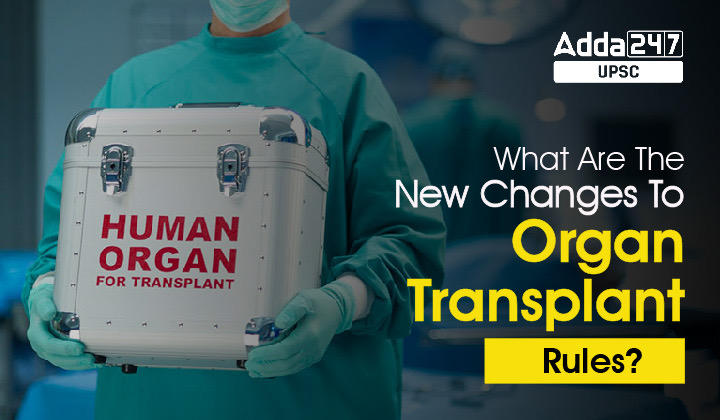Table of Contents
What Are The New Changes To Organ Transplant Rules?
In This Article, ”What Are The New Changes To Organ Transplant Rules?”, We Will Read About The Status Of Organ Transplantation In India, Organ Transplant Rules And Legislation, What Is NOTTO?, ‘One Nation, One Organ Allocation’ Policy?, etc.
Context Of Changes To Organ Transplant Rules
In News
- Recently, the National Organ & Tissue Transplant Organisation (NOTTO) has modified national organ transplantation guidelines to allow even those above 65 years of age to receive an organ for transplantation from deceased donors(cadaver).
- With this restriction removed, patients of all age groups can register for deceased donor organs.
Background
- A study shows over 40% of those in need of kidney transplants worldwide are over the age of 65.
- Also, as per the Health Ministry, the number of organ transplants has increased by over three times from 4,990 in 2013 to 15,561 in 2022.
Status Of Organ Transplantation In India
Increased Number: According to data accessed from the Health Ministry, the number of organ transplants have increased by over three times from 4,990 in 2013 to 15,561 in 2022.
Live Donors V/S Deceased Donors: Of the 15,561 transplants in 2022, a majority — 12,791 (82%) — are from live donors and 2,765 (18%) are from deceased organ or cadavers transplants.
Different Organ Transplants: Up to 11,423 of the 15,561 organ transplants are for the kidney, followed by liver (766), heart (250), lung (138), pancreas (24) and small bowel transplants (3).
Third Highest Transplants in the world: India conducts the third-highest number of transplants in the world. Every year, an estimated 5-2 lakh people need a kidney transplant.
Geographical Difference: There is also a geographical skew in deceased donations. The top five states are – Telangana, Tamil Nadu, Maharashtra, Gujarat, and Karnataka — accounting for more than 85% of the total. The reason is that most organ transplant and harvesting centres are concentrated in these geographies.
India’s Organ Donation Rate: India has an organ donation rate of about 0.52 per million population.
In comparison, the organ donation rate in Spain, the highest in the world, is 49.6 per million population.
Organ Transplant Rules And Legislation
- Transplantation of Human Organs Act (THOA): In 1994, The Transplantation of Human Organs Act (THOA) was promulgated by the government of India. This act made commercialization of organs a punishable offence and legalized the concept of brain death in India allowing deceased donation by obtaining organs from brain stem dead person.
- Transplantation of Human Organs Rules 1995: The Transplantation of Human Organs Rules followed in 1995.
- Transplantation of Human Organs Rules(Amendment) 2014: Transplantation of Human Organs Rules were last amended in 2014, increasing the scope of donation and including tissues for transplantation.
What Is NOTTO?
- National Organ and Tissue Transplant Organization (NOTTO) is a national level organization set up under Directorate General of Health Services, Ministry of Health and Family Welfare.
- Besides laying down policy guidelines and protocols for various functions, it coordinates all the activities associated with organ donation and Transplantations at national level.
What Is Proposed ‘One Nation, One Organ Allocation’ Policy?
What Did The Supreme Court Say? Recently, the Supreme Court asked the Health Ministry to examine and take appropriate action on some states imposing the condition of submission of domicile certificates for patients wishing to register in the cadaver transplant registry for organ transplantation.
What Union Health Ministry is working on? The Union Health Ministry is working on a ‘One Nation, One Organ Allocation’ policy in consultation with states to come up with uniform guidelines for registration, allocation and other aspects of the process. Working towards firming up the policy, the ministry has already recommended states to remove the domicile criterion for registering those seeking organs from deceased donor for transplant procedures.
How Will One Nation, One Organ Allocation Help? A uniform policy will help patients in seeking transplant from deceased donors at any hospital in the country giving them a lot of flexibility.



 TSPSC Group 1 Question Paper 2024, Downl...
TSPSC Group 1 Question Paper 2024, Downl...
 TSPSC Group 1 Answer key 2024 Out, Downl...
TSPSC Group 1 Answer key 2024 Out, Downl...
 UPSC Prelims 2024 Question Paper, Downlo...
UPSC Prelims 2024 Question Paper, Downlo...
